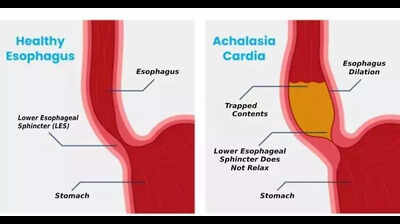Health
Surgery Restores Health for Man with Rare Esophageal Disorder

A 25-year-old man from Pune has successfully recovered from a rare swallowing disorder known as achalasia cardia, thanks to a life-saving surgical procedure performed in late June 2023. For the past five years, the patient struggled to eat, consuming less than half a roti each day, which led to significant weight loss. His weight plummeted from 75 kg to just 53 kg before the surgery, but within a month post-operation, he regained 10 kg.
Achalasia cardia is characterized by the failure of the esophagus (the food pipe) to properly move food into the stomach. This condition affects approximately one in 100,000 people annually, making it a rare diagnosis. Chetan Mhaske, a general and colorectal surgeon at Mhaske Hospital, emphasized that symptoms of achalasia can resemble those of more common conditions such as gastroesophageal reflux disease, which often delays accurate diagnoses.
“When the man consulted me on June 17, I advised several tests, including esophageal manometry, which confirmed that he was indeed suffering from achalasia,” Mhaske explained. The condition occurs when the lower esophageal muscles and the lower esophageal sphincter (LES) do not function together properly, preventing food from passing into the stomach. Typically, the LES relaxes during swallowing, but in achalasia, it remains contracted, leading to food becoming stuck.
Mhaske noted the urgency of the situation, stating, “He needed urgent surgery, so our team conducted a Heller myotomy through laparoscopy to widen his food pipe, enabling him to eat as much as he wanted.” A Heller cardiomyotomy is a minimally invasive surgical technique that involves cutting the muscle fibres of the LES to alleviate the blockage.
During a follow-up appointment on August 11, the patient expressed his happiness with the outcome. “He was able to gain 10 kg within a month,” Mhaske reported. The successful surgery not only restored the man’s ability to eat comfortably but also significantly improved his overall health and quality of life.
The case highlights the importance of timely diagnosis and intervention for rare medical conditions. With ongoing support and monitoring, the patient can now enjoy a normal diet and continue on his journey to full recovery.
-

 World5 months ago
World5 months agoSBI Announces QIP Floor Price at ₹811.05 Per Share
-

 Lifestyle5 months ago
Lifestyle5 months agoCept Unveils ₹3.1 Crore Urban Mobility Plan for Sustainable Growth
-

 Science4 months ago
Science4 months agoNew Blood Group Discovered in South Indian Woman at Rotary Centre
-

 World5 months ago
World5 months agoTorrential Rains Cause Flash Flooding in New York and New Jersey
-

 Top Stories5 months ago
Top Stories5 months agoKonkani Cultural Organisation to Host Pearl Jubilee in Abu Dhabi
-

 Sports4 months ago
Sports4 months agoBroad Advocates for Bowling Change Ahead of Final Test Against India
-

 Science5 months ago
Science5 months agoNothing Headphone 1 Review: A Bold Contender in Audio Design
-

 Top Stories5 months ago
Top Stories5 months agoAir India Crash Investigation Highlights Boeing Fuel Switch Concerns
-

 Business5 months ago
Business5 months agoIndian Stock Market Rebounds: Sensex and Nifty Rise After Four-Day Decline
-

 Sports4 months ago
Sports4 months agoCristian Totti Retires at 19: Pressure of Fame Takes Toll
-

 Politics5 months ago
Politics5 months agoAbandoned Doberman Finds New Home After Journey to Prague
-

 Top Stories5 months ago
Top Stories5 months agoPatna Bank Manager Abhishek Varun Found Dead in Well









